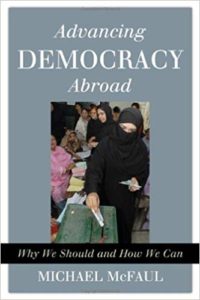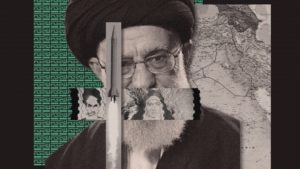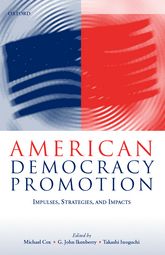 In the wake of the assassination of Qassim Suleimani, it’s imperative to note that “Iran’s capacity and inclination to cause problems for America also reflect our regional presence, posture and alliances, which mostly exist to advance a kind of mixtape of Hamiltonian and Wilsonian grand strategies — access to Middle Eastern oil, the promotion of democracy and human rights, and regime change in Tehran itself,” writes New York Times columnist .
In the wake of the assassination of Qassim Suleimani, it’s imperative to note that “Iran’s capacity and inclination to cause problems for America also reflect our regional presence, posture and alliances, which mostly exist to advance a kind of mixtape of Hamiltonian and Wilsonian grand strategies — access to Middle Eastern oil, the promotion of democracy and human rights, and regime change in Tehran itself,” writes New York Times columnist .
The United States needs to credibly demonstrate that its policy toward Iran is not a blueprint for an endless struggle, but instead an effort to encourage Iran to be more democratic and open, as political and economic change must be driven by Iranians themselves, a new report suggests. Moving forward, the United States should implement a containment strategy against Iran that attempts to de-escalate the current military situation and work toward achieving several goals, argues CSIS analyst Seth Jones:
- Prevent Iran from becoming a regional hegemon capable of dominating other states in the Middle East.
- Stop nuclear proliferation in the region and prevent Iran from developing nuclear weapons, including thwarting Iran from pursuing weapons-grade uranium enrichment, warhead development, and plutonium reprocessing.
- Curb significant Iranian military, political, and ideological expansion in the region, including the export of Iran’s revolutionary ideology.
- Encourage a process of change inside Iran toward a more pluralistic political and economic system in which the power of the clerical establishment is gradually reduced.

CSIS
In Containing Tehran: Understanding Iran’s Power and Exploiting Its Vulnerabilities, Jones highlights a range of weaknesses that make Iran vulnerable to containment and lays out the political, military, economic, and informational components of such a strategy.
But while regime-change operations might seem like a feasible policy solution to create stronger democratic institutions and better humanitarian conditions around the globe, using armed force to achieve these goals often makes things worse, argues Benjamin Denison, a postdoctoral fellow with the Center for Strategic Studies at the Fletcher School of Law and Diplomacy at Tufts University:
The unique conditions that allowed for the few successful cases—as in Germany or Japan, for example—are unlikely to present themselves again. Instead, a broader historical and social scientific lens reveals a clear pattern: foreign-imposed regime-change operations produce insecurity, undermine democracy, and often have tragic humanitarian outcomes. Employing nonmilitary means to push for democracy and humanitarian goals, as well as unlinking humanitarian aid from regime-change operations, is necessary to promote greater political freedom.
 It could be the case that it is in America’s interest to support political liberalization and the promotion of human rights abroad, but through peaceful means and support for civil society as opposed to the use of force, he writes in a new CATO Institute analysis.
It could be the case that it is in America’s interest to support political liberalization and the promotion of human rights abroad, but through peaceful means and support for civil society as opposed to the use of force, he writes in a new CATO Institute analysis.
The 2010s were horrid for those who aspire to a more cooperative and freer world. Today, every region, with the possible exception of Africa, and almost all major countries are in a worse state than 10 years ago, argues Thomas Wright, Director of Brookings’ Center on the United States and Europe.
The immediate questions confronting traditional internationalists are what type of world are we now in, and what do we do about it? There are basically two camps, which are divided by ideology, he contends:
- One group—call it the clash-of-systems school—argues that we are seeing a contest between the traditional American-led system of democracy, freedom, and openness and a Chinese-led system of autocracy and mercantilism. Each system, simply by being itself, threatens the other. …Autocratic and illiberal forces are present within Western democracies, including the United States. Internationalists must work with like-minded nations to inoculate the free world against the negative externalities of autocracy, which will include a limited economic decoupling on sensitive technologies, sharpening the lines of division on international norms, and pushing back geopolitically.
- The second camp—call them the pragmatists—worry that describing the world as ideologically divided could become a self-fulfilling prophecy leading to a new cold war. They argue that the nationalists and autocrats are in a box of their own making. We should therefore not exaggerate the nationalists’ success. They do not have a universal model for society, as the communists of the Cold War did. We should stand up for our interests and values but stop short of generalizing across countries and domains. Accommodations must be made to integrate China, and possibly Russia, into the international order if we are to work together on matters of mutual interest, such as climate change.
 A synthesis between the clash-of-systems school and the pragmatists may point toward a new consensus for a 2020s foreign policy, Wright suggests. RTWT
A synthesis between the clash-of-systems school and the pragmatists may point toward a new consensus for a 2020s foreign policy, Wright suggests. RTWT
A Cold War dichotomy pitting capitalism and democracy versus state control misreads history, according to Diana Lemberg, associate professor of history at Lingnan University in Hong Kong and author of “Barriers Down: How American Power and Free-Flow Policies Shaped Global Media.” Washington should support the universal protection of information freedom and other civil liberties, at home as well as in Hong Kong and elsewhere, she writes for The Washington Post:
But policymakers should also remember how the U.S. used regulation to advance the public good during the Cold War, despite corporate resistance. The tech leadership of the future may entail greater dialogue and coordination across borders than is presently the case. The United States needs allies if it wishes to retain this leadership.
Values for democratic resilience
Scepticism about political elites is a global phenomenon, says Stef Blok, Minister of Foreign Affairs of the Netherlands. Yet the significance of democracy can hardly be overstated, he tells Sven Lilienström of the Faces of Democracy initiative:
I still vividly remember the moment the Berlin Wall came down, when millions of people regained their liberty. But democracy without respect for fundamental rights and the rule of law risks being a hollow shell. So I would say that all these three values taken together – democracy, fundamental rights and the rule of law – are crucial for any healthy, resilient society.







